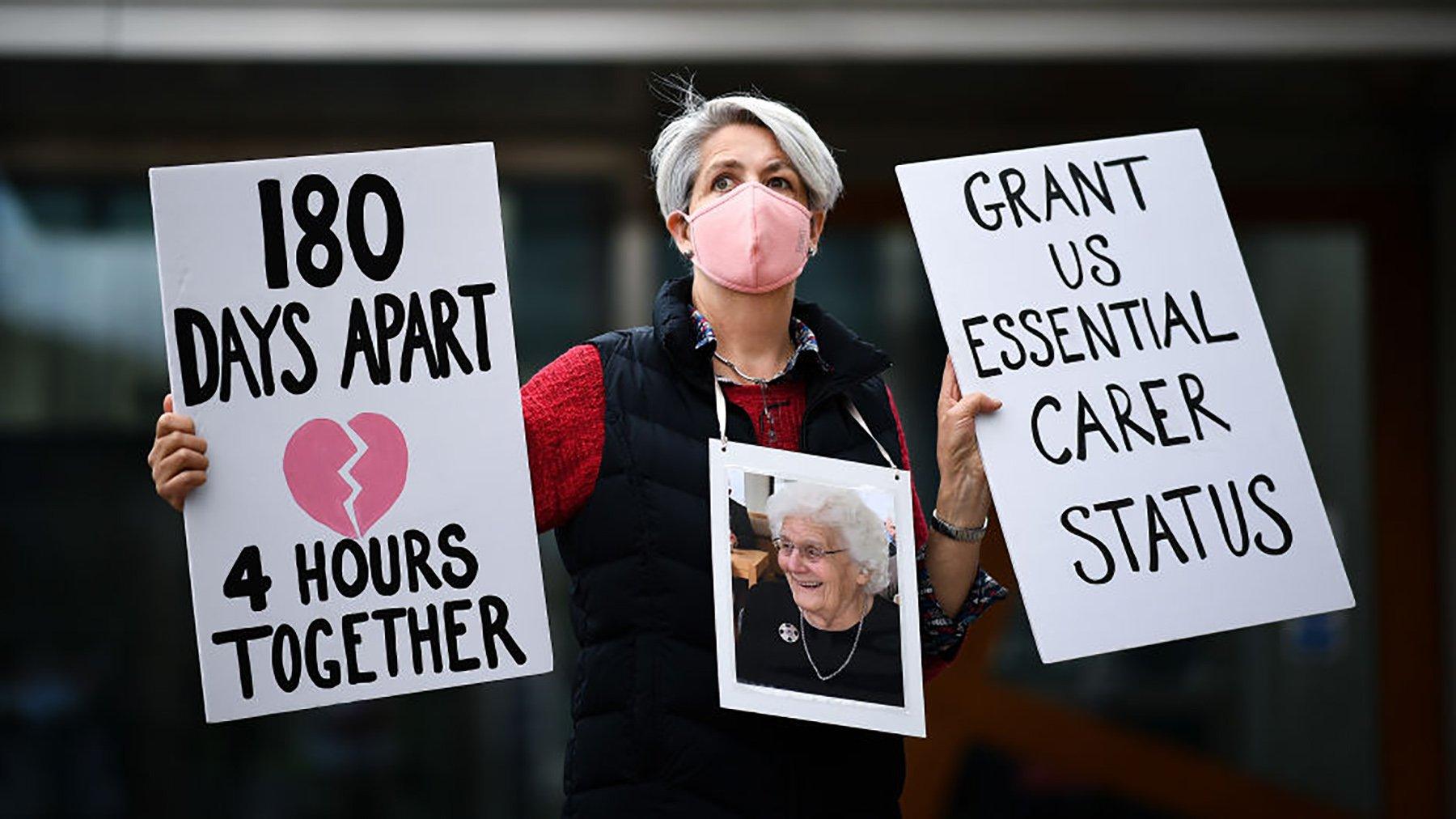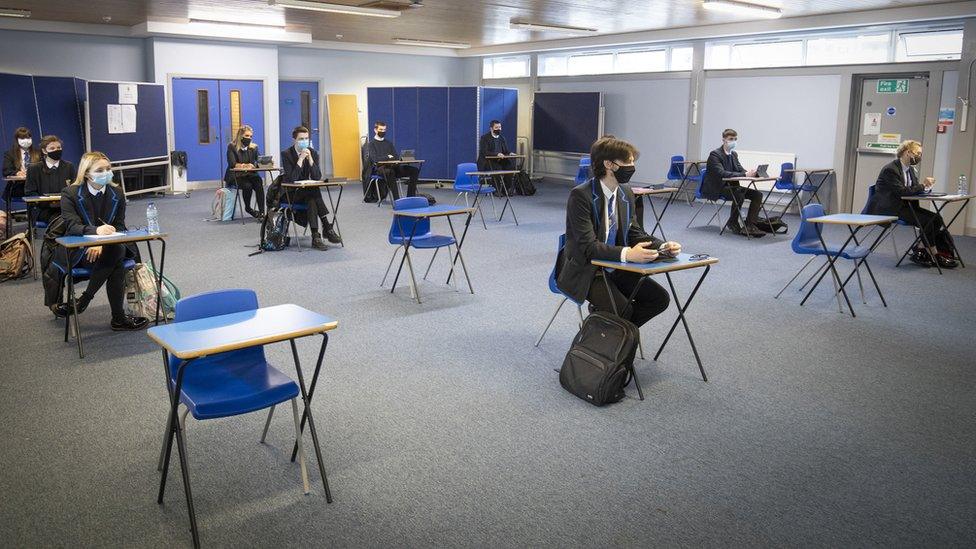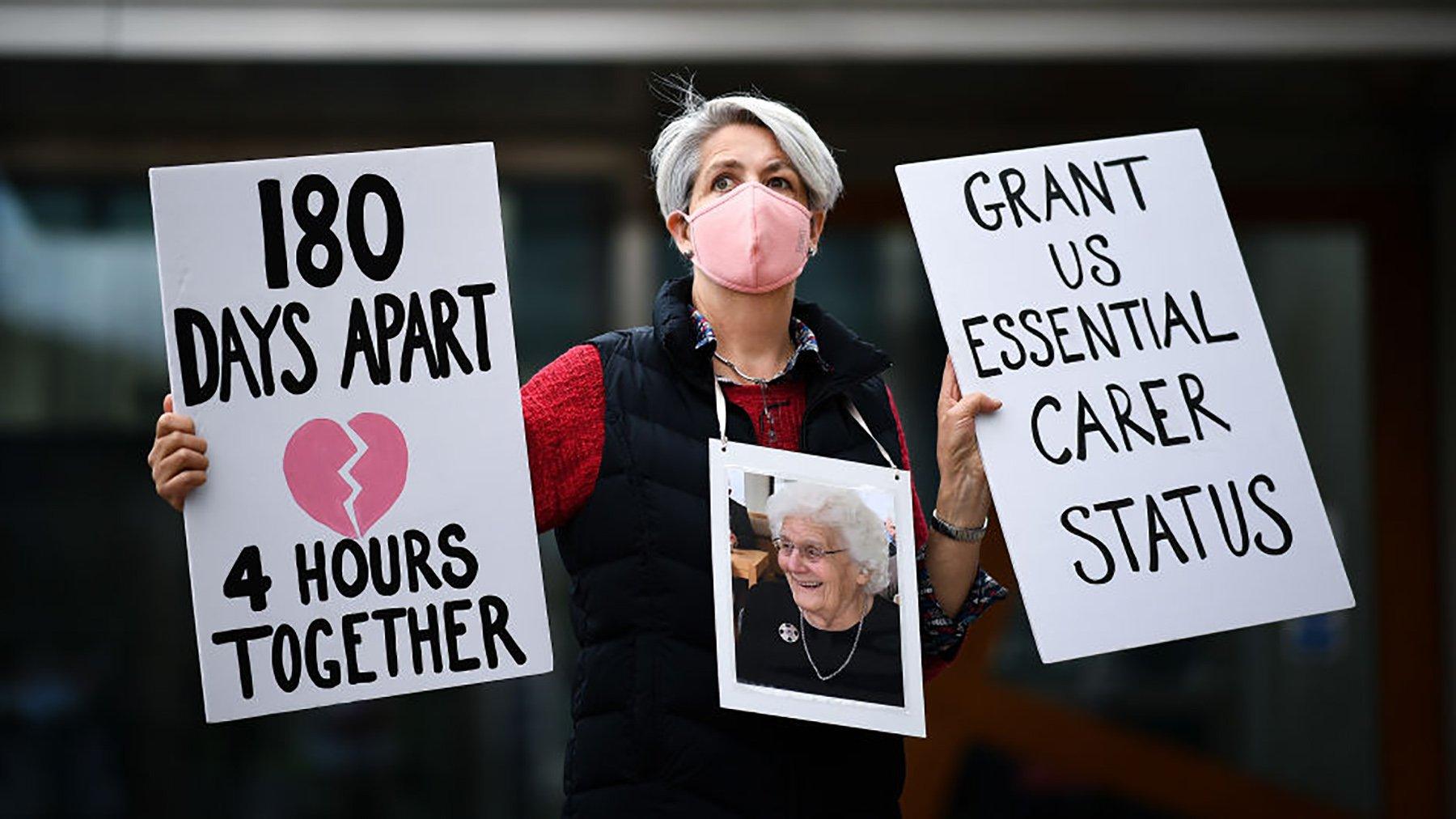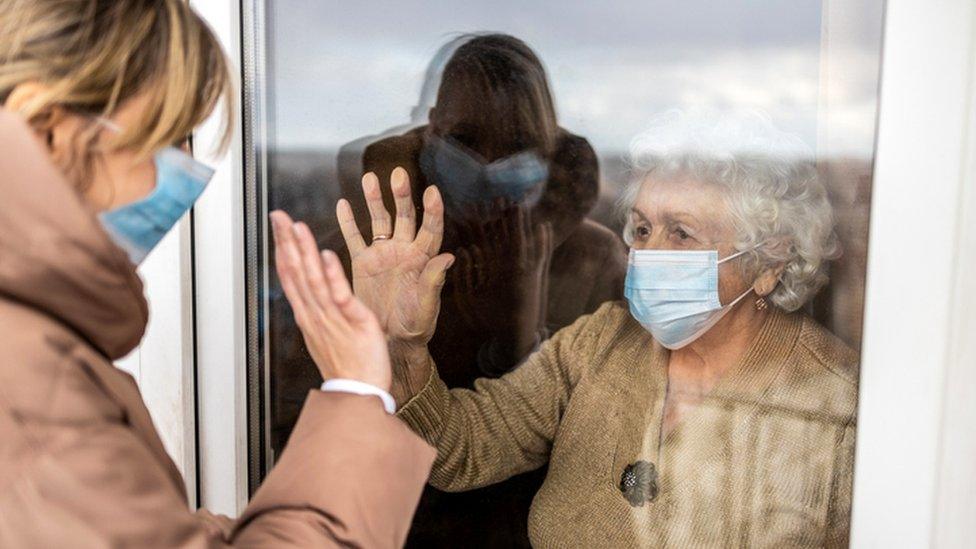Covid care home restrictions in Scotland caused harm, says report
- Published

Relatives staged a demonstration over care home visiting rules outside the Scottish Parliament in September 2020
Severe restrictions imposed on care home residents in Scotland during the Covid pandemic caused "harm and distress" and may have contributed to some deaths, academics have said.
A 143-page report has been produced by Edinburgh Napier University.
It had been commissioned by the independent inquiry, external into the country's handling of the pandemic.
The report says that the legal basis for confining residents to their rooms and banning visitors was "unclear".
And it said care home residents were arguably discriminated against compared to other citizens.
The report is one of 14 that have been published by the Scottish Covid-19 Inquiry, external, which is chaired by Lady Poole.
It found that in the early months of the pandemic there was "little evidence" that the human rights of residents and their families had been considered.
It also accepts that restrictions were to a certain extent understandable, given "the vulnerability of care home residents and the large number of deaths in the sector".
The report was compiled by a team from the university's School of Health and Social Care, led by Professor Colin McKay.

It said: "There is substantial evidence of the harm and distress caused to residents and their families by the restrictions imposed in care homes.
"This includes concerns that, particularly for people with dementia, being unable to maintain contact with their family exacerbated cognitive and emotional decline, potentially hastening their death."
The report also said: "Overall, there is convincing evidence that while public health measures were brought in to protect the Scottish population, the impact of these changes on the daily lives of some vulnerable populations and people involved in their care were not fully considered."
Another report from Edinburgh University said 50% of all Covid-related deaths in Scotland between March and June 2020 had involved care home residents.
It said Scotland had the highest rate among care home residents in the UK during the first wave of the pandemic.
And it said a lack of testing before hospital patients were discharged to care homes contributed to Covid outbreaks.

Edinburgh University academics looked at the impact on education
A report from the University of Highlands and Islands said the inquiry should be a catalyst for change.
"The inhumane policy for care homes, where residents were unable to see their families, contained in their rooms 24/7 and where some residents died alone, should be acknowledged and not repeated," it said.
"Risk of infection during a pandemic must be weighed against the risk of losing humanity."
'Not fit for purpose'
Donald Macaskill, chief executive of Scottish Care, told the BBC's Good Morning Scotland programme that he had tried to raise concerns.
"The conditions laid and the restrictions imposed were extremely severe," he said.
"I think most of us indicated we had to be very careful that some of the restrictions were not likely to cause more harm than they were to save lives."
He also said that the planning for a potential pandemic did not involve the social care sector.
He said: "Social care was nowhere. We were not at the table in terms of preparation for a pandemic.
"Therefore it is hardly surprising that there was insufficient guidance sensitive to the context of care homes, but guidance written for a hospital which is simply not fit for purpose for someone's own home."
Scottish Conservative social care spokesman Craig Hoy said the "deeply worrying" report pointed to further shortcomings in the government's response to care homes.
He added: "It appears that as well as being lax in allowing untested patients to be discharged from hospital to care homes, the simultaneously strict restrictions imposed on those within care homes caused such harm and distress to residents that they may have led to further deaths too.
"This toxic mix of the casual and severe had deadly consequences in Scotland's care homes and it's clear lessons must be learned by SNP ministers."
Last month, Deputy First Minister John Swinney said the Scottish government had tried to create the "safest environment possible" in care homes early in the pandemic.
A spokesperson for the inquiry said the academic papers contained the views of the authors and did not represent the position of the inquiry, which will carry out its own investigations.
The areas the reports looked at
1. Education
A report by Edinburgh University on education said the pandemic represented a setback for Scotland's young people.
It highlighted mental and physical health as a significant issue, and said lockdown and school closures "exacerbated existing disadvantage".
It also says that Scotland responded rapidly to the emergency of March 2020 and the following two years saw "significant innovation, creativity and collaboration".
The report says the move to online teaching provided some continuity for pupils, but there were issues around access to technology and resources.
It also pointed out that staff worked far beyond their already heavy workloads during lockdown.
2. Planning
Another report was produced by Edinburgh University's Usher Network for Covid-19 Evidence Reviews (Uncover) on pandemic planning
It said: "The preparation that had taken place prior to the pandemic enabled Scotland to respond quickly on multiple fronts, from NHS intensive care capacity to legislative drafting for emergency measures.
"However, prior emergency planning exercises had also identified gaps in Scotland's readiness, including in respect of PPE availability and training, and clarity of guidance, which had not been fully addressed by the time the pandemic began."
3. Financial support
A report from Professor Francis Greene at the University of Edinburgh said the Scottish government had been "ill-prepared for the pandemic" and that its strategy had been reactive rather than proactive.
It said the support provided to businesses by the UK and Scottish governments was a "significant factor" in explaining the "muted impact" on businesses and employees.
While the support was welcomed by Scottish businesses, there were "significant concerns" about fraud and losses, the targeting of such schemes, and difficulties in accessing support.
And while support for those in need was also welcomed, there were concerns about the impact of the pandemic on the household finances of those on low incomes in the future.
Related topics
- Published16 June 2022

- Published1 May 2022

- Published27 April 2022
